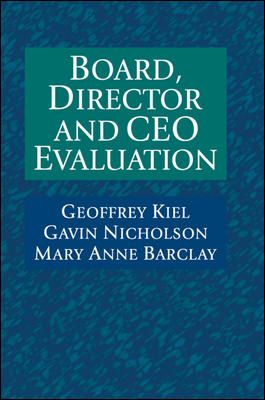Board, Director and CEO Evaluation
Receive via shipping:
- Colour, print bound version of the complete text
1 Introduction
1.1 Increasing pressure for board evaluations
1.2 Objections to the board evaluation process
1.3 Advantages of board evaluation
1.4 Framework for a board evaluation
1.5 Conclusion
2 Setting objectives for your board evaluation
2.1 What does the board hope to achieve?
2.2 Getting started
2.3 First-time evaluations
2.4 Conclusion
3 Who will be evaluated?
3.1 Criteria for deciding who to evaluate
3.2 Board as a whole
3.3 Board committees
3.4 Individual directors
3.5 Chairperson
3.6 Lead independent director
3.7 Company secretary
3.8 CEO
3.9 Conclusion
4 What will be evaluated?
4.1 The governance balancing act
4.2 Refining the evaluation’s objectives
4.3 The Corporate Governance Charter framework
4.4 Applying the framework
4.5 Other best practice frameworks
4.6 Conclusion
5 Who will be asked?
5.1 Potential sources of information
5.2 Determining who to ask
5.3 Conclusion
6 Evaluation techniques
6.1 A research methods primer
6.2 Qualitative analysis
6.3 Quantitative analysis: the survey
6.4 Conclusion
7 Who conducts the evaluation process?
7.1 Internal reviews
7.2 External reviews
7.3 Conclusion
8 Communicating the results
8.1 Who will be advised?
8.2 How and about what will they be informed?
8.3 Conclusion
9 Evaluating your CEO
9.1 Relationship between the board and CEO
9.2 Pressures for increased CEO evaluation
9.3 Advantages of the CEO evaluation process
9.4 Designing a CEO evaluation process
9.5 Steps in the CEO evaluation process
9.6 Using the results of the evaluation process
9.7 Conclusion
10 Implementation
10.1 The implementation process
10.2 The performance evaluation cycle
10.3 Persuading the board to implement regular evaluation
10.4 Conclusion
11 Conclusion
Appendix 1 Board-as-a-whole questionnaire 1
Appendix 2 Board-as-a-whole questionnaire 2
Appendix 3 Individual director self-evaluation questionnaire 1
Appendix 4 Individual director self-evaluation questionnaire 2
Appendix 5 Directorial competence self-assessment questionnaire
Appendix 6 Individual director peer-evaluation questionnaire 1
Appendix 7 Individual director peer-evaluation questionnaire 2
Appendix 8 CEO evaluation tool 1
Appendix 9 CEO evaluation tool 2
Appendix 10 CEO 360-degree feedback questionnaire (extract)
Appendix 11 Sample questions for board-as-a-whole evaluation
Appendix 12 Sample questions for individual self-evaluation
Appendix 13 Sample questions for individual peer evaluation
Appendix 14 Sample CEO job description
Bibliography
Index
6.2 Qualitative analysis
6.3 Quantitative analysis: the survey
6.4 Conclusion
7 Who conducts the evaluation process?
7.1 Internal reviews
7.2 External reviews
7.3 Conclusion
8 Communicating the results
8.1 Who will be advised?
8.2 How and about what will they be informed?
8.3 Conclusion
9 Evaluating your CEO
9.1 Relationship between the board and CEO
9.2 Pressures for increased CEO evaluation
9.3 Advantages of the CEO evaluation process
9.4 Designing a CEO evaluation process
9.5 Steps in the CEO evaluation process
9.6 Using the results of the evaluation process
9.7 Conclusion
10 Implementation
10.1 The implementation process
10.2 The performance evaluation cycle
10.3 Persuading the board to implement regular evaluation
10.4 Conclusion
11 Conclusion
Appendix 1 Board-as-a-whole questionnaire 1
Appendix 2 Board-as-a-whole questionnaire 2
Appendix 3 Individual director self-evaluation questionnaire 1
Appendix 4 Individual director self-evaluation questionnaire 2
Appendix 5 Directorial competence self-assessment questionnaire
Appendix 6 Individual director peer-evaluation questionnaire 1
Appendix 7 Individual director peer-evaluation questionnaire 2
Appendix 8 CEO evaluation tool 1
Appendix 9 CEO evaluation tool 2
Appendix 10 CEO 360-degree feedback questionnaire (extract)
Appendix 11 Sample questions for board-as-a-whole evaluation
Appendix 12 Sample questions for individual self-evaluation
Appendix 13 Sample questions for individual peer evaluation
Appendix 14 Sample CEO job description
Bibliography
Index
6.4 Conclusion
7 Who conducts the evaluation process?
7.1 Internal reviews
7.2 External reviews
7.3 Conclusion
8 Communicating the results
8.1 Who will be advised?
8.2 How and about what will they be informed?
8.3 Conclusion
9 Evaluating your CEO
9.1 Relationship between the board and CEO
9.2 Pressures for increased CEO evaluation
9.3 Advantages of the CEO evaluation process
9.4 Designing a CEO evaluation process
9.5 Steps in the CEO evaluation process
9.6 Using the results of the evaluation process
9.7 Conclusion
10 Implementation
10.1 The implementation process
10.2 The performance evaluation cycle
10.3 Persuading the board to implement regular evaluation
10.4 Conclusion
11 Conclusion
Appendix 1 Board-as-a-whole questionnaire 1
Appendix 2 Board-as-a-whole questionnaire 2
Appendix 3 Individual director self-evaluation questionnaire 1
Appendix 4 Individual director self-evaluation questionnaire 2
Appendix 5 Directorial competence self-assessment questionnaire
Appendix 6 Individual director peer-evaluation questionnaire 1
Appendix 7 Individual director peer-evaluation questionnaire 2
Appendix 8 CEO evaluation tool 1
Appendix 9 CEO evaluation tool 2
Appendix 10 CEO 360-degree feedback questionnaire (extract)
Appendix 11 Sample questions for board-as-a-whole evaluation
Appendix 12 Sample questions for individual self-evaluation
Appendix 13 Sample questions for individual peer evaluation
Appendix 14 Sample CEO job description
Bibliography
Index
Corporate governance demands an increased focus on the leadership role of the board, the CEO and the directors and the call for these to be more accountable for their own performance is a growing global trend. Board, Director and CEO Evaluation helps to implement the recommendations for evaluation that haven been included in almost every major corporate geovernance review or report.
This practical guide is based on the authors' extensive research and consulting experience and provides the information necessary to carry out board, director or CEO evaluations. The authors discuss current thinking in best practice corporate governance and outline the benefits of evaluation. They use diagrams, checklists and practical examples to illustrate key concepts and include questionnaires to evaluate the performance of boards, committees, directors and CEOs.
As board, director and CEO performance is critical to today's organisation, this book is an essential business tool.

